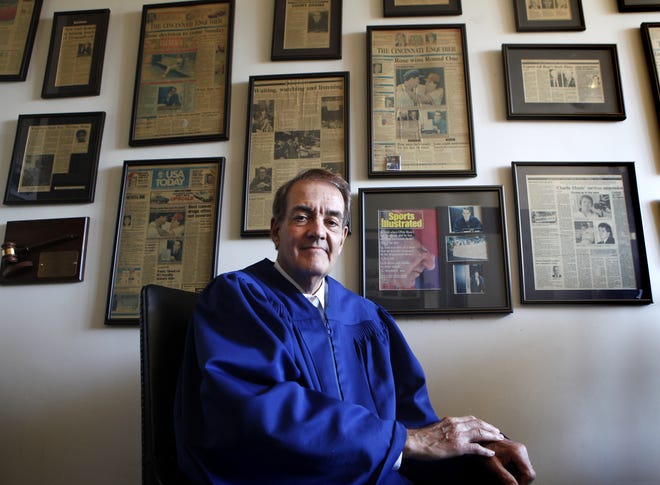

Long-time judge Norbert Nadel, the man who tried and failed to save Pete Rose from Major League Baseball's gambling investigation, died Friday after a short illness. He was 82.
Known for wearing a bright blue robe that matched his colorful personality, Nadel handled some of the biggest and most controversial court cases in Hamilton County while serving for more than three decades as a Common Pleas Court Judge.
He also worked as an assistant federal prosecutor, an assistant city prosecutor and, after retiring from the bench, as Hamilton County's recorder. Along the way, Nadel mentored a generation of young clerks who went on to work as prosecutors and defense attorneys.
"He was a very loyal friend," said Mark Krumbein, a defense attorney who's known Nadel for decades. "He gave the greatest advice."
Never one to shy away from a TV camera, or any camera, really, Nadel welcomed the chance in 1989 to weigh in on what would become the biggest case of his career. It happened when the lawyers for hometown hero Rose sought a restraining order halting baseball's investigation into the Reds' manager's gambling.

Nadel became convinced that then-Baseball Commissioner Bart Giamatti had "prejudged" the case against Rose and had made up his mind to ban him from baseball without hearing all the evidence. He granted the restraining order in a rare Sunday court hearing that was broadcast live across the nation.
As with most big cases, Nadel wore his trademark blue robe for the occasion, a departure from the usual black worn by most jurists. He liked the color, he told friends, and he thought it was more "telegenic" than a black robe.
The reprieve for Rose was brief, however, as Nadel's ruling was overturned almost immediately on appeal and baseball's investigation continued, ultimately ending with a suspension of Rose that remains in place today.
Nadel, though, never wavered. He said Rose got a raw deal. "You can't be afraid to do what you think is right," he told The Enquirer in a 2014 interview. "If you are, you shouldn't be here."
National media and more than a few legal experts cried foul after the ruling, saying the judge gave the Hit King a hometown break. Nadel didn't mind. In his office, he hanged a framed copy of the Sports Illustrated cover story that included his photo and quoted from his ruling.
Steve Goodin, a Cincinnati City Council member who clerked for Nadel in the late 1990s, said the Rose ruling was classic Nadel. He had a different take on a case that many people already thought they'd figured out.
But was he playing to the hometown crowd? "Of course he was," Goodin said. "But that doesn't mean he didn't have a point, too."

Years later, Nadel met Rose and introduced himself. The former ballplayer said no introduction was necessary, and then signed a copy of his book: "To Judge Nadel, thanks for being fair to me."
Though he was a lifelong Republican, Goodin said, Nadel didn't play favorites as a judge. He said Nadel gave fits in equal measure to Democrats and Republicans, prosecutors and defense attorneys, plaintiffs and defendants because none of them knew for certain what he might do.
If the judge believed someone was trying to push him around, Goodin said, Nadel would push back. He always told his clerks to never judge a case before they hear the evidence, and he relished a good trial as much as anyone in the courthouse, believing it was the best way to get to the truth.
Before the start of a trial, Goodin recalled, Nadel would say, "Let's see what happened."
Though Nadel never had children, he took an interest in the lives of his clerks. He recommended them for jobs and encouraged them to pursue their interests. Goodin said the former clerks called themselves "the Nadel Club," because the judge stayed in touch with them long after they left his courtroom and began careers of their own.
Friends and colleagues say Nadel also had a soft spot for the less fortunate. After befriending a homeless man he met outside the courthouse, they say, the judge allowed him to store some of his clothing in his jury room closet.
Every week or so, the man would stop by to change clothes and wash up in the sink near Nadel's chambers. Then he'd hang around for a bit, chatting with the judge about baseball and the Reds, two of Nadel's favorite subjects.
When the man died years later, Nadel took up a collection around the courthouse to buy him a gravestone.
Nadel didn't start his career in law or immediately show an interest in politics. When his father died while he was in high school, Nadel took over the family's retail business, which he continued to run while attending college and, later, night classes at Chase Law School.
He started his career in the city solicitor's office and then moved to the U.S. Attorney's office as a top assistant. He served for more than 30 years as a Common Pleas judge before being forced to retire because of state-mandated age limits.
Retired judge Sylvia Hendon said Nadel loved being in a courtroom and was generous with colleagues and friends when they needed advice on the law, careers and politics. Hendon said he was whip-smart and had a "wicked sense of humor."
When asked for an example, Hendon declined.
"You can't print my favorite memory," she said.
Goodin said Nadel knew how to work a ballroom as well as a courtroom. Though he didn't drink or smoke, Nadel was a regular at small and large parties around town. "He loved going to parties," Goodin said.
Whether at work or hanging out with friends, Goodin said, Nadel always was in the middle of the action.
"He was one of the most colorful people at the courthouse," he said.
Nadel is survived by his wife, Linnea. Funeral arrangements have not been announced.
The Enquirer will update this story
Source link








